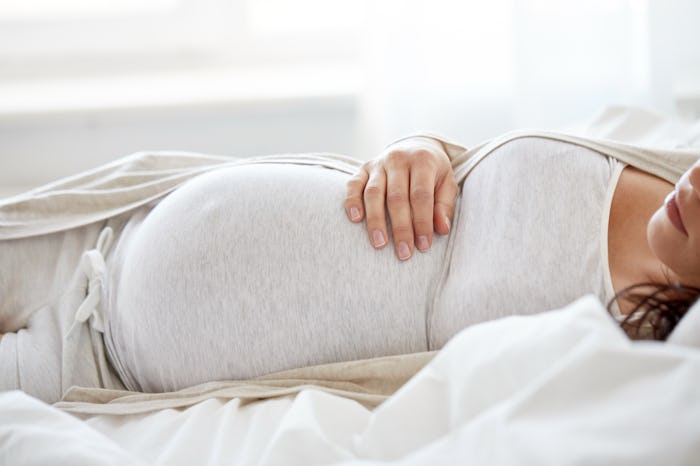News

New Study Explores Why Very Stressed Pregnant Women Are More Likely To Have Girls
From mimicking heart attack symptoms, digestive issues, and excess sweating, stress can do some wild things to the human body. And now, a recent study has found that stress during pregnancy may impact a baby's sex. That's right, researchers at Columbia University in New York determined that expectant mothers who feel overwhelmed or depressed are more likely to give birth to a girl than a boy.
For the study — published in the Journal of the Proceedings of the National Academy of Sciences (PNAS) — researchers analyzed the stress levels of 187 pregnant women, using data gathered through questionnaires, diaries, and physical assessments, according to CNN. Of those women, researchers noted that roughly 17% of them were psychologically stressed, shown by high levels of depression and anxiety. An additional 16% of the participants showed signs of "physical stress," including greater caloric intake and high blood pressure.
Regardless of which type of stress the women were experiencing, researchers found that those who showed signs of stress gave birth to girls more often than boys. Roughly 105 males are born for every 100 females, under normal circumstances, according to the study. But in Columbia's research found that the male-to-female ratio was 2:3 for psychologically stressed moms and 4:9 for physically stressed moms.
As for why this phenomenon occurs, researchers suggested that it could be explained by the comparatively long early development stages of male fetuses, leaving them more vulnerable to stresses in the womb, according to CNN. Lead researcher in the study, Professor Catherine Monk, explained in a press release that the results are common following catastrophic events.
"Other researchers have seen this pattern after social upheavals, such as the 9/11 terrorist attacks in New York City, after which the relative number of male births decreased," Monk said. "This stress in women is likely of long-standing nature; studies have shown that males are more vulnerable to adverse prenatal environments, suggesting that highly stressed women may be less likely to give birth to a male due to the loss of prior male pregnancies, often without even knowing they were pregnant."
Past studies have suggested that stress during pregnancy can have other impacts on the fetus. For example, according to Science Daily, a 2017 study out of Zurich suggested that extreme stress over a long period time can increase the risk of the unborn child developing a mental or physical illness later in life, such as attention deficit hyperactivity disorder (ADHD) or cardiovascular disease.
However, stress symptoms and implications can also impact the mother. Stress can cause undesirable physical effects, such as sleep problems, digestive issues, headaches, muscle tension, and high blood pressure, according to the Mayo Clinic. However, it's important to keep in mind that everyone experiences stress, and higher stress during pregnancy is common due to the hormonal changes in your body, as March of Dimes noted.
Keeping this in mind, as The Telegraph reported, Monk explained in her statement that the new study was not intended to "alarm women or blame them," but to prompt them to seek help and support if they are concerned about the prenatal stress: "It’s an important opportunity to find ways to manage your stress, whether it’s meditation, time with family, friends, religion or knitting."
Studies referenced:
Walsh, K., Mccormack, C. A., Webster, R., Pinto, A., Lee, S., Feng, T., … Monk, C. (2019). Maternal prenatal stress phenotypes associate with fetal neurodevelopment and birth outcomes. Proceedings of the National Academy of Sciences, https://www.pnas.org/content/early/2019/10/08/1905890116